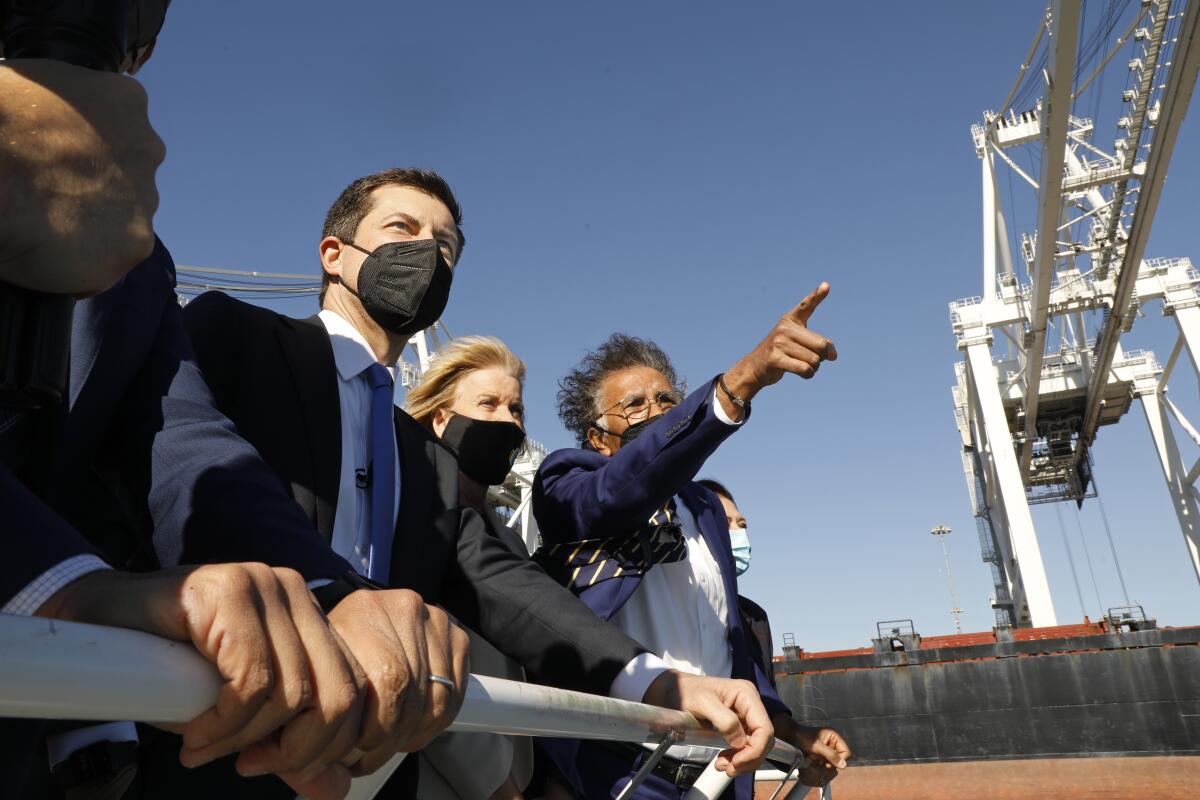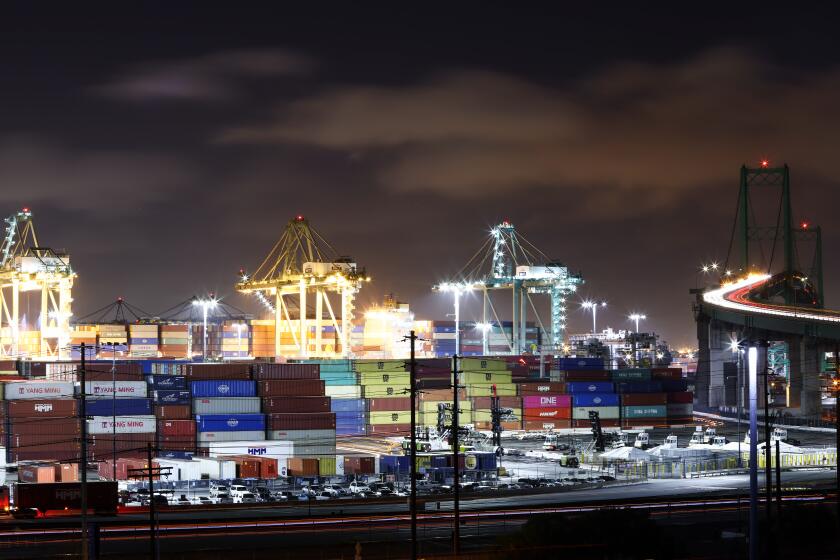Christmas was saved from the supply-chain bottleneck. The next challenge: Lunar New Year

- Share via
The supply-chain nightmare didn’t cancel Christmas, but another holiday crisis is looming: the Lunar New Year.
Local lawmakers and port officials accompanying U.S. Transportation Secretary Pete Buttigieg at the Port of Long Beach on Tuesday acknowledged enduring problems with the shipping, unloading and delivery of goods across the country, including the challenge of getting the local ports — a major choke point — to operate around-the-clock.
And though one holiday crisis appears to have been averted, a fresh surge of cargo from Chinese manufacturers is expected to flood U.S. ports before Chinese businesses close up to celebrate the Year of the Tiger starting Feb 1.
The wave of cargo ships carrying goods to U.S. consumers is expected to reach California in the next two or three weeks, port officials said.
On Tuesday, as Buttigieg praised local officials for moves that eased bottlenecks around the holiday period, 60 cargo ships idled offshore near the Long Beach port, waiting for their turn to dock.
The supply-chain crisis is not over, Gene Seroka, executive director of the Port of Los Angeles, said while touring the Long Beach port with Buttigieg.
The logjam at the ports and larger supply chain disruptions have led to record-setting profits for big companies in the logistics business.
“No one is taking a victory lap,” he said in an interview. “No one is high-fiving each other.”
A key hurdle: Officials have been unable to get the Los Angeles port to operate around-the-clock, as planned and announced in October under a Biden administration strategy to address the supply-chain crisis ahead of the holiday period.
Under the plan, the port expects to nearly double the number of hours that cargo moves off container ships and onto highways by having crews work through the night, with members of the International Longshore and Warehouse Union filling the extra shifts.
But Seroka said the effort has been hampered because most elements of the supply chain — including warehouse operators and truck drivers — don’t operate 24 hours a day, making it difficult to accept cargo at the ports in the middle of the night when workers aren’t available to receive the products. Making matters worse, he said, is a shortage of truck drivers and warehouse workers since the start of the pandemic.
“It’s the private sector that needs to drive this,” he said.
Buttigieg also acknowledged more work was needed to resolve the supply-chain problem.
In an interview with The Times, he said the ports needed more funding to modernize their facilities and adjacent rail lines and roads to ease bottlenecks during the next cargo surge.
“We’ve got to be ready for the unexpected,” he said.
Buttigieg visited the ports of Los Angeles and Long Beach for an update on remedies to the supply-chain problem, which stemmed from COVID-19 outbreaks that forced the closure of many manufacturers and ports in Asia that were later slow to ramp back up to meet rebounding U.S. demand.
Once goods began to arrive by sea at a record pace, the ports were inundated and unable to unload and distribute cargo fast enough. The Biden administration, port officials and others took several steps to ease the backlog, including imposing fines on shippers who left cargo containers clogging the docks and devising a plan to operate the ports 24 hours a day, seven days a week.
Together the two sprawling ports are responsible for handling nearly half of all imports into the United States, making them a key part of logistical networks strained by the coronavirus crisis.
Buttigieg’s visit caps a series of efforts to ease the supply-chain backlog.
Officials at the ports started Nov. 15 to impose a fee on containers that sit around for more than six days if intended for rail transport or nine days if intended for trucks. The ocean carrier companies that brought in those idling containers face fines of $100 on the first day past deadline, $200 on the next and so on.
Since Nov. 1, the number of idled cargo containers clogging the Port of Long Beach has been reduced by more than 40%, said Mario Cordero, executive director of the port. No fines have yet to be collected because the threat is working, he said.
Seroka said the mere threat of fines has already reduced the number of cargo containers at the Port of Los Angeles by 60% since Oct. 24.
About a dozen elected officials, labor leaders and port executives at a news conference at the Long Beach port extolled the recent efforts to keep store shelves full during the holiday season.
Los Angeles Mayor Eric Garcetti introduced Buttigieg as “the man who saved Christmas.”
Mastercard SpendingPulse, which tracks cash and debit card payments, reported in late December that holiday sales had risen 8.5% from a year earlier, a point officials said illustrates how supply-chain problems didn’t hamper holiday spending. Purchases of clothing and jewelry fueled the results, which covered Nov. 1 through Dec. 24. Holiday sales were up 10.7% compared with the 2019 holiday period, before the pandemic.
Buttigieg has taken a lead role for the Biden administration in addressing the supply-chain problem. In October, California Gov. Gavin Newsom and Buttigieg announced $5 billion in loans to help modernize California’s seaports.
In December, Buttigieg announced $52.3 million in infrastructure grants from the U.S. Department of Transportation to make improvements at the Port of Long Beach for a new locomotive facility, extension of the east rail yard and extension of the west rail yard.
Buttigieg told the crowd of officials and port executives that as long as the country is battling a pandemic, the supply chain won’t be free of glitches.
“Supply chains are human,” he said. “Supply chains are people.”
More to Read
Inside the business of entertainment
The Wide Shot brings you news, analysis and insights on everything from streaming wars to production — and what it all means for the future.
You may occasionally receive promotional content from the Los Angeles Times.











